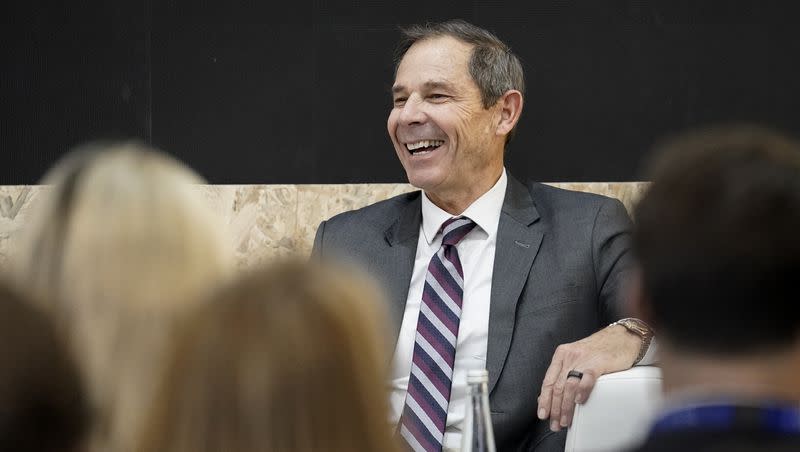Rep. John Curtis defends clean fossil fuels at contentious climate conference

Rep. John Curtis said fossil fuels are an essential part of a clean energy transition after his trip to the annual United Nations climate conference even as international delegates and activists protested the lack of commitments to phase out fossil fuels.
Curtis attended his third “Conference of the Parties” this weekend in Dubai, United Arab Emirates, where he joined bipartisan panels on permitting reform, presented legislation that would clarify climate negotiations with other countries and advocated for the inclusion of fossil fuels in energy transition proposals.
“Fossil fuels represent 80% of the world’s energy right now — you’re not going to replace that with windmills and solar farms,” Curtis told the Deseret News Tuesday after returning to the U.S. Monday night. “So we need to start having a discussion about the role of fossil fuels in our clean energy future.”
Related
The future of conservative environmentalism is bright, Utah congressmen say to young conferencegoers
But it was the absence of language demanding the elimination of fossil fuels at the conference that caused an uproar Monday among environmental groups and some Western and island nations.
What happened at COP28?
After days of negotiations among the nearly 200 assembled countries, organizers of the COP28 event released a draft deal that encouraged nations to reduce fossil fuel use to achieve net zero by 2050. But the text left out provisions requiring a total “phase-out” of fossil fuels — which numerous countries, including the U.S., EU members and small island nations, had called for.
The language suggesting the elimination of fossil fuels had been rejected by representatives of developing countries like China and India, according to Politico. OPEC members, whose countries depend heavily on oil exports to support their economies, also encouraged COP28 attendees to push for a deal that left room for long-term production of fossil fuels, Reuters reported.
The influence of emerging economies and fossil fuel lobbyists on the deal caused former vice president and climate activist Al Gore to despair in a social media post following the draft’s release.
“COP28 is now on the verge of complete failure,” Gore said on X. “The world desperately needs to phase out fossil fuels as quickly as possible, but this obsequious draft reads as if OPEC dictated it word for word.”
But Curtis said such reactions are the result of impractical expectations.
“The fact that you’re going to send all of these nations and they’re somehow going to walk away holding hands with these very, very difficult issues, I think is a little bit unrealistic,” Curtis said.
Unlike some members of the Biden administration and international community, Curtis said he is optimistic about what the conference was able to accomplish, particularly by waking people up to the fact that fossil fuels must be part of a vision for a clean, reliable and affordable energy transition.
Over his three years at COP, Curtis said he has seen the same trend emerge for nuclear energy, which went from being taboo among climate activists to being acknowledged as a key component of the solution.
“I think if you are willing to look at overall trends of these meetings you can see a real positive direction,” Curtis said.
Was Curtis’ trip to COP28 successful?
One of the biggest shifts at the U.N. climate conference, according to Curtis, is in conservative representation, something he has spearheaded since founding the Conservative Climate Caucus in 2021. That same year, Curtis attended COP26 with a handful of Republicans who were seen as pariahs attempting to undermine the conference.
Related
“People were suspicious of us being there, that we were there basically to debate the science, and not realizing that we were there to be thoughtful,” Curtis said.
A year later, Curtis’ delegation was much more prepared to tap into key conversations, he said, and were able to articulate a conservative approach to climate issues on an international stage.
This year, Curtis attended the event as a leading member of the House Energy and Commerce Committee, with Republicans outnumbering Democrats during some panels in a dramatic reversal from past years.
“To see in three years us move from being on the periphery to being very influential and conservative ideas at the heart of discussion, I think it was really impactful to see that difference,” Curtis said.
Over the weekend, Republican lawmakers made the case that not only is a fossil-fuel-free future unrealistic, it would also be economically disastrous.
“Republicans are taking a lead in an issue that has traditionally not been one we’ve participated in,” Curtis said. “And we’re showing the world that there are answers to this that are very much in line with conservative, Republican ideas, and perhaps more importantly, in a way that’s incredibly important to Utah and Utah’s economy.”
Curtis’ 3rd District encompasses Utah’s coal country, the oil-rich Uinta Basin and the nation’s sole operating uranium processing plant near Blanding, and could soon be home to a second plant near Green River, Utah.
“Right now, Utah needs somebody fighting for our energy sector and on the world stage for me to be able to make the case that the energy coming from Utah will be relevant, not just in five and 10 years, but long into the future,” Curtis said.

During the conference, Curtis spoke with Rep. Scott Peters, D-Calif., about a bill they are co-sponsoring to highlight America’s leading role in reducing carbon emissions. The Prove It Act would commission a government study to document U.S. emissions so the country can use its own data in negotiations with other nations about how to distribute the weight of emission reductions.
Another point of bipartisan consensus at COP28, Curtis said, was the need to eliminate regulatory barriers that stymie “every sector of the energy industry,” including energy innovation and power grid expansion.
“The world saw Republicans and Democrats on the same stage agreeing on issues that are very important to Utahns,” Curtis said.

